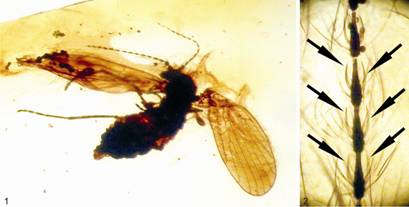
Amber is not rich in China, and only some spare records have been reported. Fushun, a city in Liaoning Province of northeastern China, comprises six coal-mining districts, of which the West Opencast Coalmine (Xilutian Opencast Coalmine) yields lots of ambers. The West Opencast Coalmine, the largest opencast coalmine in Asia, was ever the largest amber deposit in China, but it is exhausted nowadays.
The family Psychodidae (Diptera: Nematocera) are small true flies with short, hairy bodies and wings giving them a moth-like appearance. Trichomyiinae is a subfamily of short-legged psychodids, having the radial sector with only one vein between radial and medial forks.
Dr. WANG Bo from Nanjing Institute of Geology and Palaeontology, Chinese Academy of Sciences and other scientists recently described a new species belonging to Trichomyiinae based on a well-preserved specimen from the Lower Eocene Fushun amber of China. This fossil shares some similarities with some extant and fossil Trichomyiinae, but retains some archaic features, such as non-excentric flagellomeres and long legs. This discovery representsthe first Trichomyiinae (Psychodidae) from the Fushun amber, and adds more evidence on the very high palaeodiversity of the psychodids since at least the Lower Cretaceous.
Paper reference: Wang Bo, Zhang Haichun, Azar Dany. (2011) The first Psychodidae (Insecta: Diptera) from the Lower Eocene Fushun amber of China. Journal of Paleontology, 85(6):1154-1159
